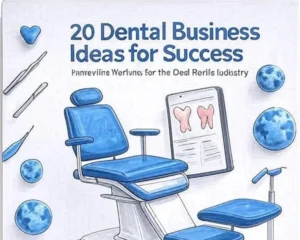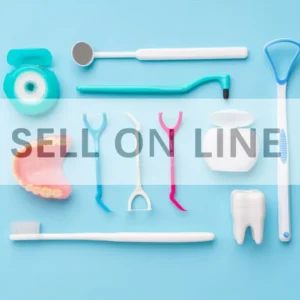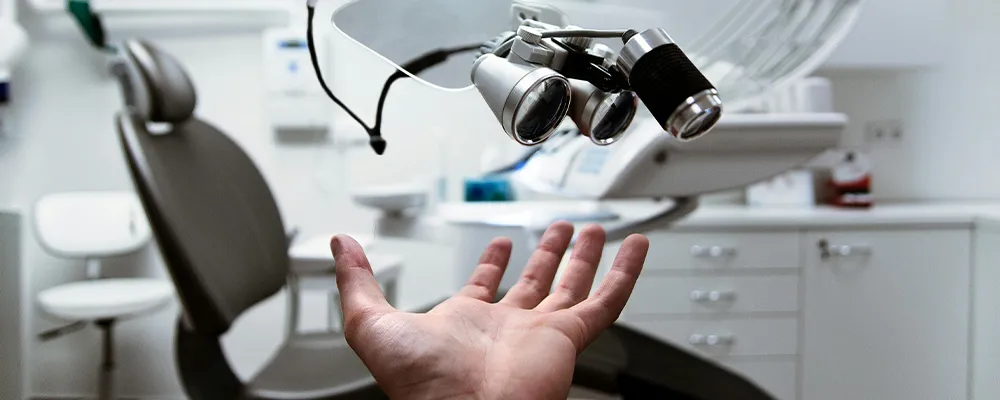
Selling dental equipment is not just about listing items online—it’s about building a reliable sales system. This guide walks you through everything from licensing and product selection to online marketing and international supply chains.
1. Obtaining Licenses to Sell Dental Equipments
Before selling dental equipment, you must comply with your local market’s laws and regulations. Dental products are medical devices in most countries, and the rules are strict. Skipping this step can lead to delays, legal penalties, and a loss of customer trust. Taking time to fully understand the compliance landscape is essential to building a long-term, legitimate business.
What You May Need:
- A business license or company registration certificate
- Medical device sales permits or certifications (e.g., FDA in the U.S., CE marking in Europe, NMPA in China)
- Proof of product safety and quality: ISO 13485 for quality management, or GMP compliance for manufacturing standards
- In some markets, a designated in-country representative or authorized distributor may be required to handle regulatory filings
- Import licenses or product registrations for cross-border sales
- Language and labeling requirements specific to the local health authority
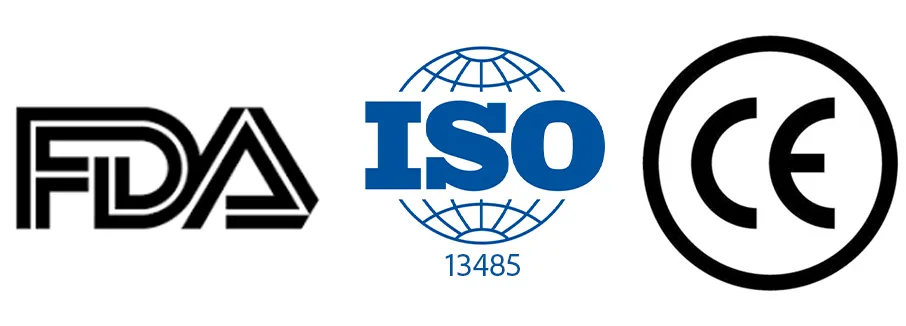
Understanding and complying with regulations is the foundation of a sustainable business. Many markets require registration with a national medical device authority, periodic renewals, safety testing documentation, and clear labeling practices. Depending on the class of the dental device, there may also be additional clinical trial data or post-market surveillance requirements.
Some countries classify dental products into different categories—Class I, II, or III—based on the risk level. Each classification has different levels of documentation and approval procedures. For example, a disposable dental mirror may only require a declaration of conformity, while an ultrasonic scaler could require full clinical testing and review.
International Sales Tip: If you plan to sell across borders, harmonizing your product documentation to meet the strictest standard (e.g., FDA or CE) can streamline market entry into other countries.
✅ Tip: Consult a legal advisor, medical device consultant, or your local chamber of commerce. You can also visit the official websites of regulatory bodies (like FDA.gov, EMA.europa.eu, or TGA.gov.au) to access their latest guidelines.
2. Choosing A Channel to Sell Dental Equipment
Selecting the appropriate sales channels is crucial to the success of your dental product business. Your target market, team capacity, and product type will all influence which channels are most suitable. Many successful companies use a multi-channel approach to reach different customer segments and maximize exposure. Let’s explore six of the most effective and widely used methods to sell dental products, both online and offline.
Diversifying your sales channels not only reduces dependency on a single platform but also increases your chances of discovering high-converting customer touchpoints. Below is a breakdown of each channel with strategic insights for effective use:
A. Online Marketplaces (e.g., Amazon, eBay, OZON, JOOM)
These platforms offer instant access to a vast customer base. They are perfect for entry-level sellers looking for immediate market penetration without the overhead of building an independent website.
Pros:
- Instant visibility and built-in traffic
- Simplified logistics with fulfillment options (e.g., FBA on Amazon)
- Trust signals that help new customers buy with confidence
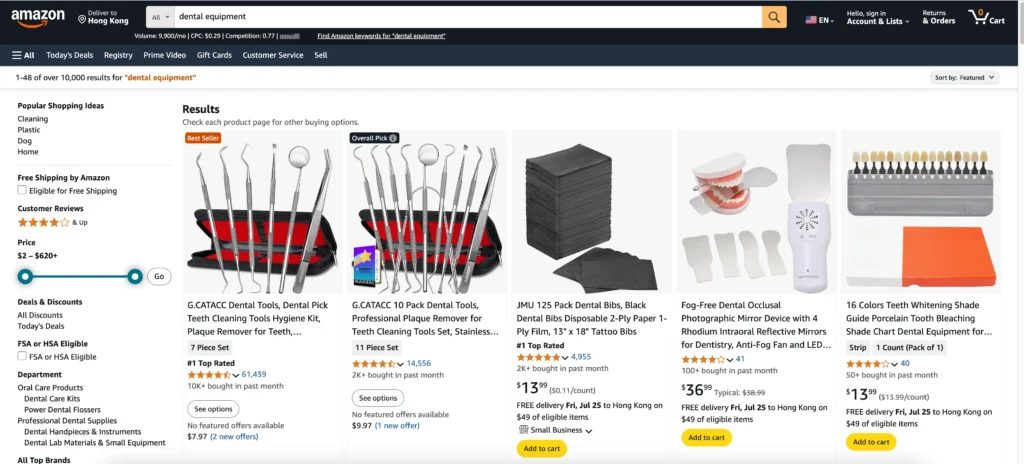
Challenges:
- Intense competition and price wars
- Commission fees and advertising costs can eat into profits
We’ve prepared a complete guide to selling dental products online that you can check out to get started quickly.
Tips for Success:
- Focus on niche products with less competition
- Optimize listings with high-quality images, SEO-friendly titles, and informative descriptions
- Monitor customer reviews and respond promptly to feedback
- Utilize PPC campaigns to gain visibility during early growth
B. Social Media Sales
Social platforms like Facebook, Instagram, TikTok, and LinkedIn allow you to humanize your brand and reach highly engaged niche communities.
Why it works:
- Builds brand recognition through consistent content
- Allows direct communication with potential buyers
- Enables viral sharing of content such as video demonstrations and testimonials
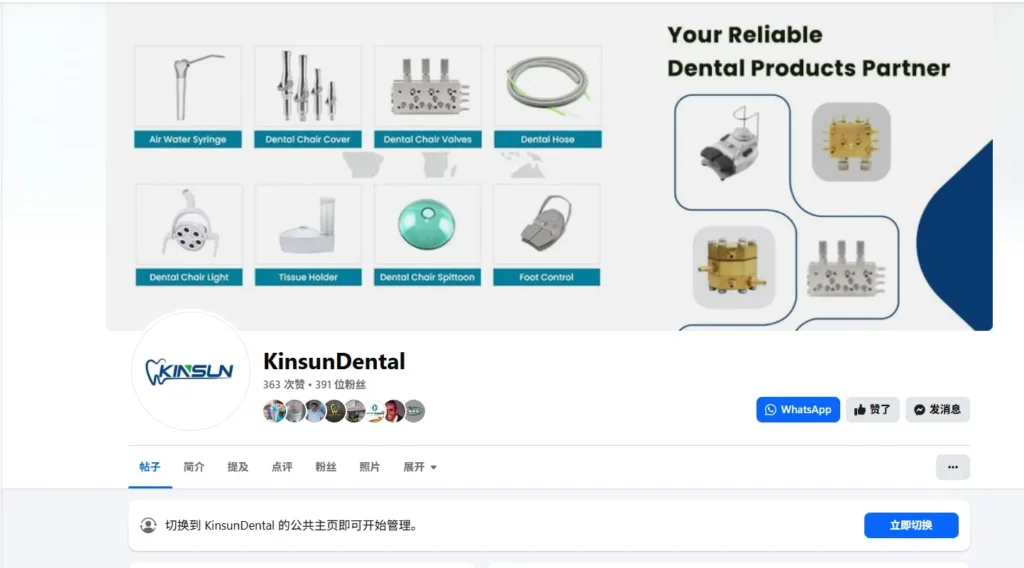
Strategies to Leverage Social Media:
- Run interactive campaigns such as giveaways, Q&A sessions, or live product demos
- Partner with dental influencers for credibility and reach
- Share user-generated content and behind-the-scenes visuals
- Use targeted ads to reach dental professionals or clinics
C. Your Own Website (WordPress, Shopify)
Having a dedicated e-commerce website boosts your brand’s credibility and gives you full control over the customer experience.
ข้อดี:
- Collect valuable customer data for remarketing
- Control your brand presentation without platform limitations
- Better profit margins by avoiding third-party fees
Key Features to Include:
- Intuitive navigation and search functionality
- Product education content (e.g., blogs, videos, FAQs)
- Integrated customer support such as live chat or chatbot
Investing in content marketing and SEO can drive long-term organic traffic to your website.
D. Government or Institutional Bidding
Tapping into public procurement opportunities, such as tenders from hospitals or universities, can yield large, stable contracts.
Benefits:
- Higher order volumes
- Long-term contracts
Getting Started:
- Register with government or healthcare procurement portals in your target country
- Build a professional tender submission portfolio with references, product certifications, and testimonials
- Stay informed about upcoming opportunities by subscribing to bid notifications
Having a local partner or agent can help navigate complex regulatory and procedural landscapes in institutional bidding.
E. Trade Shows and Exhibitions
Dental and medical trade shows offer unparalleled access to qualified buyers, distributors, and industry influencers.
ข้อดี:
- Face-to-face interaction builds trust
- Opportunity to demonstrate product functionality
- Brand exposure to a concentrated audience

Preparation Tips:
- Book your booth early and design an engaging display
- Offer promotional samples and informational brochures
- Train staff to answer technical questions and capture leads
- Follow up with visitors within 48 hours to maximize conversions
Some global trade shows also offer virtual booths and webinars, which can be a more affordable option for startups.
F. Academic & Training Sponsorships
Partnering with dental training institutions or continuing education providers can create direct access to your target customer base: dentists and hygienists in training.
Why It Works:
- High trust environment
- Leads to long-term brand loyalty
How to Approach:
- Provide equipment for training purposes or sponsor educational programs
- Offer student discounts or affiliate programs for educators
- Host your own workshops or webinars and invite trainees to participate
These relationships often lead to recurring bulk orders as new professionals set up their own practices.
By thoughtfully selecting and managing your sales channels, you establish a resilient business model that can grow and evolve in tandem with your brand.
3. Choose the Right Product Niche
Selecting the right dental product niche is one of the most critical decisions you’ll make when entering the market. The dental industry is vast, covering everything from high-end equipment like digital imaging systems and dental chairs to small disposable items like cotton rolls and saliva ejectors. To avoid becoming overwhelmed, especially if you’re just starting out, it’s wise to focus your efforts on a specific, manageable product line.
Start Narrow, Grow Broad:
Begin with 2–3 closely related product types that serve a common audience. For example, if you target dental hygienists, focus on cleaning tools, ultrasonic scalers, and prophylaxis angles. If your audience is cosmetic dentists, whitening systems and intraoral cameras may be a better entry point.
Recommended Entry-Level Niches:
- Simple equipments for dental clinic: dental handpiece, dental scaler, curing lamp,dental accessories.
- Whitening & aesthetics: whitening gel, LED lamps, cheek retractors
- Basic surgical tools: probes, tweezers, extraction forceps
- Orthodontic kits: ligature wires, brackets, separators
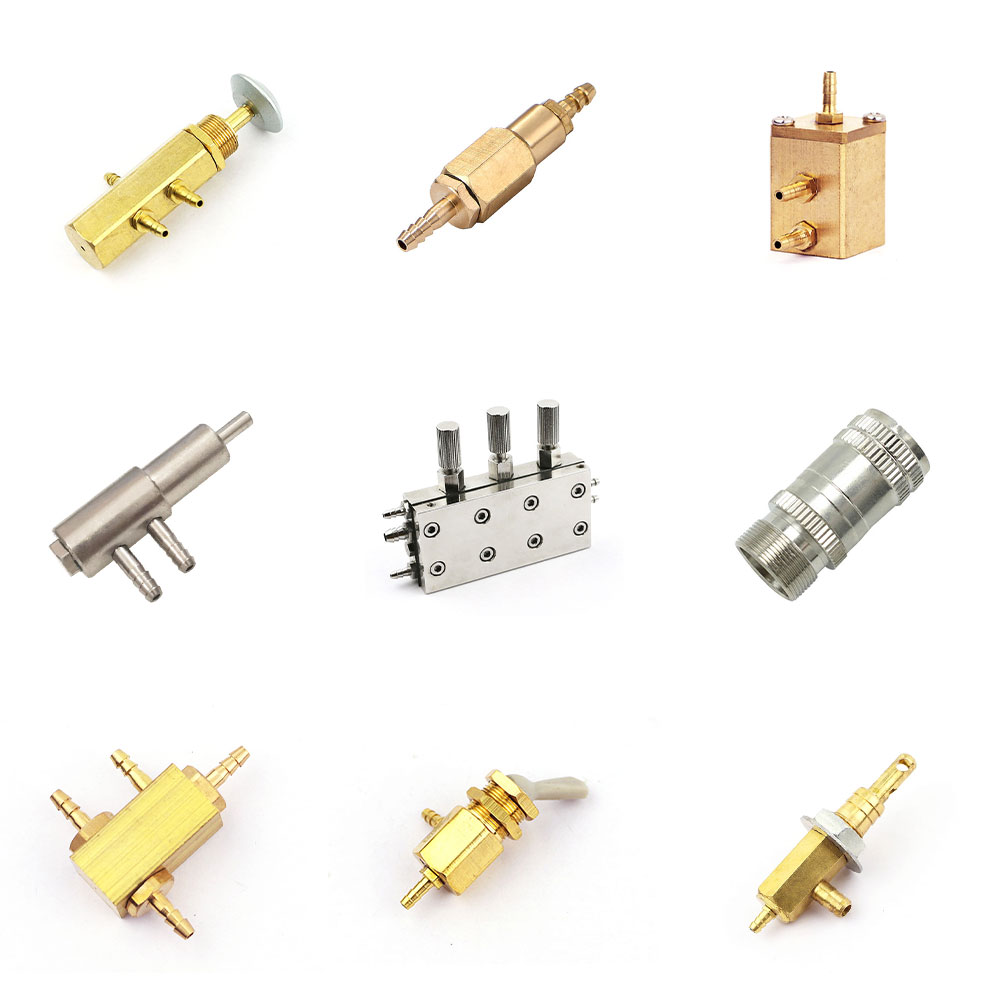
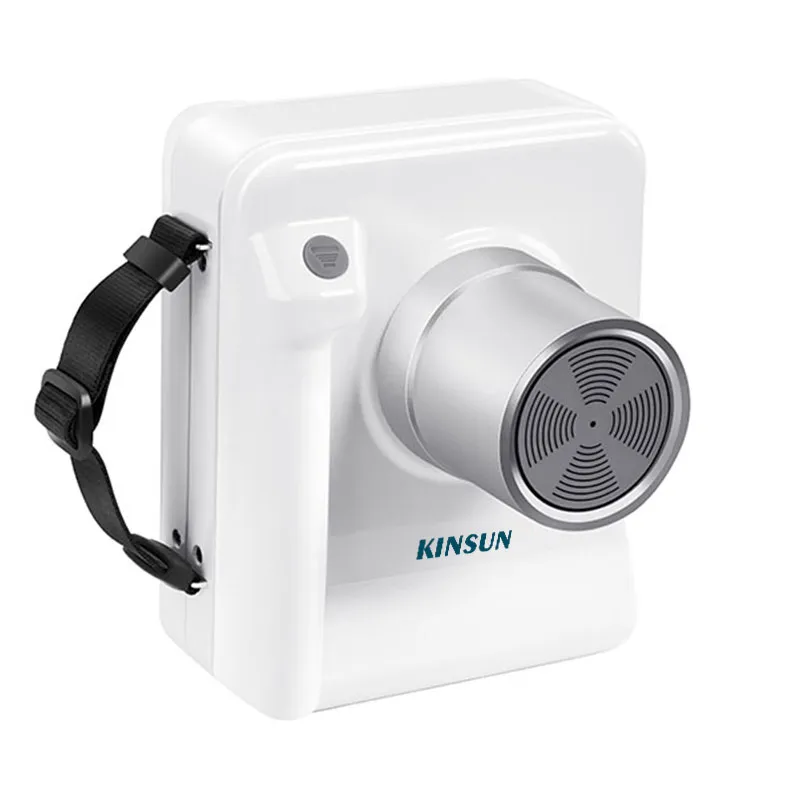
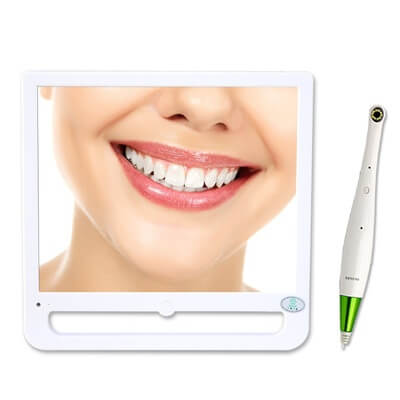
Tiered Product Strategy:
Offer good-better-best options:
- Entry-level: Budget items from Chinese OEM suppliers
- Mid-range: Clinically certified products at affordable prices
- Premium: Global brands like NSK, 3M, KaVo. etc.
Research Suggestions:
- Use Google Trends, Amazon Bestsellers, and Reddit forums for demand signals
- Interview local dentists about pain points or under-served tools
- Test with small quantities before scaling your inventory
Compliance Note:
Even low-tech items like cotton rolls must meet medical standards. Always verify if a product requires documentation or labeling based on your local health authority’s requirements.
By choosing a niche wisely, you not only reduce business risk but also position your brand as a trusted expert in a particular corner of the dental world.
4. Evaluating Your Dental Sales Team
Not every team has the same capacity. Aligning your sales approach with your team’s size, expertise, and available resources will help you avoid burnout and ensure efficient execution. A startup with two people shouldn’t pursue the same strategy as an enterprise with a dedicated marketing and logistics department.

Evaluate Your Resources
Start by honestly assessing what your team can handle:
- How many people do we have, and what are their core skills?
- Can we manage logistics and warehousing, or do we need a third-party solution?
- Is there technical product knowledge in-house?
- How much time can be spent on customer service and marketing per week?
- Do we have budget to hire external support (e.g., freelancers or agencies)?
Suggested Sales Strategies by Team Size
| Team Type | Recommended Channels |
|---|---|
| Solo/Startup | Online marketplaces + social media only |
| Small team (3–10) | Marketplaces + own website + basic SEO & email flows |
| Growing business | All online + trade shows and partnerships |
| Enterprise-level | Full channel strategy + sales reps + global logistics |
Startups may do better focusing on 1–2 high-leverage channels like Amazon or TikTok, while mid-sized teams can start integrating content marketing, SEO, and paid ads on Google or Facebook. Enterprises, on the other hand, can afford to build local distribution networks, hire sales reps, and attend international exhibitions.
Define Clear Roles
To execute any strategy efficiently, define roles clearly—even in a small team:
- Sales & Support: Answers inquiries, closes deals, handles post-sale questions
- Inventory & Logistics: Manages stock levels, coordinates with warehouses, ensures timely delivery
- Marketing & Growth: Manages ads, SEO, email marketing, and promotions
- Product & Supplier Relations: Works directly with manufacturers to manage quality and costs
If your team is very small, consider outsourcing some roles temporarily, especially digital marketing and customer service.
Use Tools to Stay Efficient
- Trello / Asana: Task management & pipeline tracking
- Slack / Discord / Teams: Real-time communication
- Google Sheets / Notion: Shared product catalogs or SOPs
- Canva / CapCut: Quick content design and video editing
Pro Tip: Standardize
As you grow, start documenting key workflows—like how to onboard a new product or respond to a return request. These Standard Operating Procedures (SOPs) will save time and ensure consistency as you scale or bring on new staff.
5. Work with Reliable Dental Products Suppliers
Your choice of suppliers can make or break your dental product business. A reliable supplier not only ensures consistent product quality but also helps you meet regulatory requirements, shorten delivery cycles, and respond quickly to market trends. Establishing long-term partnerships with professional suppliers will significantly reduce your operational risks.
What Makes a Dental Products Supplier “Reliable”?
Key qualities to look for:
- Certifications: Ensure suppliers have relevant certifications like ISO 13485 (medical device quality), CE (Europe), FDA (U.S.), or other local equivalents.
- Production capacity: Can they fulfill your orders during peak season without delays?
- Communication: Do they respond promptly and clearly? Miscommunication leads to costly mistakes.
- Customization support: Can they offer OEM/ODM options, custom packaging, or labeling services?
- After-sales support: Will they replace defective items or provide technical documentation when needed?
- Logistics experience: Especially for international sellers, suppliers should be familiar with shipping rules, customs processes, and export documentation.
Domestic vs. Overseas Suppliers
| Type | Pros | Cons |
|---|---|---|
| Local | Faster shipping, easier communication | Higher cost, fewer product options |
| Overseas | Competitive pricing, wide product selection | Longer lead time, cultural and language barriers |
For emerging markets, Chinese suppliers are often the most efficient and cost-effective. The country hosts the world’s largest dental supply ecosystem, offering everything from dental chairs to orthodontic wires at competitive rates.
How to Source Trusted Suppliers
Recommended methods:
- Attend major dental trade shows (like IDS Germany, AEEDC Dubai, or Dental South China)
- Use verified sourcing platforms like Alibaba, Global Sources, and Made-in-China
- Contact manufacturers directly via their websites, such as KINSUN.
- Request references and follow up with their existing customers
- Ask for samples to evaluate quality before placing bulk orders
Building Strong Supplier Relationships
Once you’ve found a good supplier, nurture the relationship like a business partner:
- Pay on time to build trust and goodwill
- Give consistent feedback so they can improve product quality
- Forecast your demand so they can prepare inventory
- Negotiate long-term agreements for better pricing and priority production
Strong supplier relationships also give you leverage when negotiating new products or needing urgent shipments.
If you want to purchase dental products from China, you can contact KINSUN. We can provide you with one-stop services such as quotation, payment, transportation, customs declaration, customs clearance, etc. We can also provide you with OEM customization services, which will save your time and money and help you quickly start your dental business.
6. Action Checklist for Launch
📂 Business Setup
- Register your company
- Apply for medical sales license
- Understand your target country’s import policies
📦 Product Preparation
- Select 2–3 product categories
- Source reliable suppliers
- Create photos, videos, and manuals
🌐 Sales Channels
- Open accounts on Amazon/eBay or Mercado Libre.
- Launch social media profiles
- Build a basic WordPress or Shopify site
- Start with a small paid ad test (e.g., Google Ads)
7. บทสรุป
Selling dental products is a long game—but one that pays off if you build a strong foundation. Focus on a niche, be legally compliant, and grow your network steadily. By using multiple channels and working with quality suppliers, your brand can grow from a small e-commerce project to a regional or global player in dental care.


